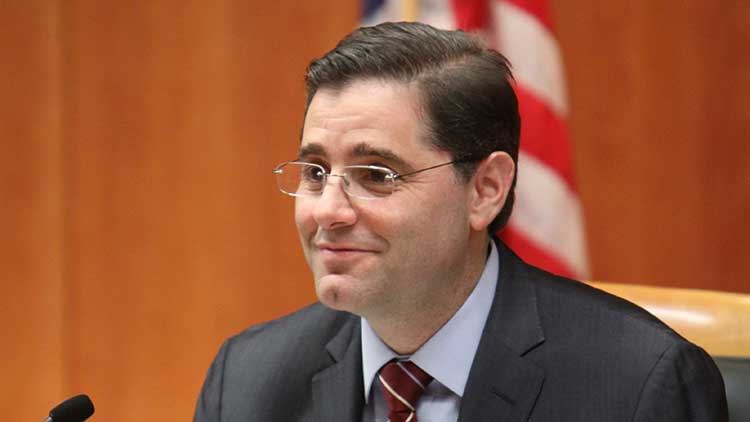Genachowski: Auction Was 'Amazing Success'

The smarter way to stay on top of broadcasting and cable industry. Sign up below
You are now subscribed
Your newsletter sign-up was successful
Reaction was swift to the conclusion Friday of the clock phase of the FCC's broadcast incentive auction, including from the former FCC chairman under whose watch the National Broadband Plan was drawn up and the auction proposed and a current commissioner who has some issues.
"This auction has been an amazing success," former FCC Chairman and current partner and managing director of the Carlyle Group Julius Genachowski told B&C. "It freed up an unprecedented amount of wireless spectrum, and that matters even more than dollars raised because the spectrum will generate more innovation, more investment, more consumer benefits, and ultimately more revenue for the Treasury and taxpayers.
"As for auction proceeds, at almost $20 billion this is the second most lucrative FCC auction in history. In 2009, when the FCC warned about a spectrum crunch and proposed this first-of-a-kind auction, people thought it was a pipe dream. But it happened – on a bipartisan basis – and shows that government can work and generate value for the public. It’s essential that the FCC continue to be the global leader on innovative spectrum policy."
Related: FCC Finalizes Auction Repack Expense Guidance
"It is a great public policy success in using market forces to avoid what could have been a pothole-filled mobile information superhighway," said Blair Levin, architect of the National Broadband Plan, told B&C. "I hope someone notices that using smart, transparent market incentives to create a platform for economic growth is actually better than ad hoc personal jawboning."
"While I am pleased that the forward auction has closed and we don’t have a failed auction on our hands, significant review is necessary to understand how the FCC rules and auction design impacted the results," said FCC Commissioner Michael O'Rielly. "Although Congress provided a strong statute to utilize market forces to ensure spectrum is put to its most efficient use, including for necessary wireless voice and data licenses, the previous majority’s implementation appears to have been based on some assumptions that were far off the mark [the FCC started out with a 126 MHZ clearing target, but wound up only auctioning 84 MHz]. Additionally, there is a lot of work ahead to minimize disruption for non-participating broadcasters while ensuring these spectrum blocks are cleared expeditiously."
"My carrier friends will regret the prime spectrum they left on the table," said Preston Padden, former executive director of the Expanding Opportunities for Broadcasters Coalition. "5G is a futuristic sound bite. 600 MHz is reality today." Padden represented stations interested in participating in the auction, but the coalition had to disband after the FCC's rules on prohibited communications kicked in.
The smarter way to stay on top of broadcasting and cable industry. Sign up below
Related: House Slates FCC Reauthorization Hearing
The National Association of Broadcasters, most of whose members are still in the business and facing what amounts to a second digital transition, was focused on that future.
"Now that the clock phase in the forward auction has concluded and the FCC prepares for the assignment phase, the Commission can turn greater attention to developing a transition plan that will protect viewers and treat all stakeholders fairly," said NAB executive VP of communications Dennis Wharton.
FCC Chairman Ajit Pai said Friday that the FCC "must ensure uninterrupted access to over-the-air television," and said that would be one of his priorities.
"Today, the FCC made history," said Competitive Carriers Association President Steven Berry. "[W]ith the help of a market-based mechanism to stimulate greater participation, the auction successfully allocated seven blocks of prime beachfront spectrum while meeting Congress's directive to promote deployment of new technologies, products, and services to all Americans, including 'those residing in rural areas,' without the threat of market dominance thwarting competition.
"I thank Congress for authorizing and ensuring a successful auction, and congratulate the FCC for concluding the clock portion of this auction, which resulted in the second highest amount of net bids of any FCC spectrum auction. CCA members look forward to a safe and efficient post-auction transition, and will continue to work with the Commission to utilize this spectrum for the benefits of consumers, carriers and the economy."
The top revenue raiser among FCC auctions was the AWS-3 wireless spectrum auction conducted on former FCC Chairman Tom Wheeler's watch, as was the incentive auction, all but the closing chapter.
"We can now conclusively say that the FCC’s voluntary incentive auction was a success," said Telecommunications Industry Association interim CEO David Heard. "The first-of-its-kind incentive auction will clear 84 MHz of ‘beachfront’ spectrum in the 600 MHz band, including 70 MHz for licensed services, and gross $19.6 billion from wireless carriers and other bidders. As it prepares to transition the spectrum, the FCC deserves great credit for effectively driving this forward over the last five years."
Contributing editor John Eggerton has been an editor and/or writer on media regulation, legislation and policy for over four decades, including covering the FCC, FTC, Congress, the major media trade associations, and the federal courts. In addition to Multichannel News and Broadcasting + Cable, his work has appeared in Radio World, TV Technology, TV Fax, This Week in Consumer Electronics, Variety and the Encyclopedia Britannica.

